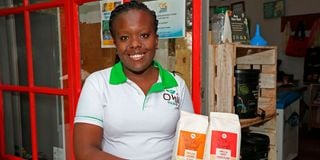All eyes on healthy scoop of earnings in flour enterprise

Onja Foods founder Mary Karoki displays some of her products at Shamba Cafe Loresho on August 4, 2023.
Mary Karoki, who holds a diploma in Business IT, followed the healthy foods debate from a different angle and saw a gap. She saw in the gap a business idea and chose flour as her product.
She went for the alternative crops, some of them are fast-disappearing as consumption patterns change.
In 2018, she founded Onja Foods, an agro-processer that provides foods to health-conscious consumers seeking wellness and an alternative lifestyle.
Ms Karoki saw a business opportunity in alternative flours by adding value to drought-resistant crops while promoting responsible production.
Among other triggers, she read in the Global Market Insights report that gluten-free food market will be valued at $12.5 billion (Sh1.8 trillion) by 2025, only one and a half years from today.
Food allergies and food intolerances are growing public health concerns causing higher consumer demand for products that are tailored to meet special diets.
She also saw in the flour business an income-generating opportunity that would supplement her earnings from the cleaning business she was running.
“During my deliveries, I interacted with cassava flour and it was also at this point that I first interacted with the term ‘gluten-free’. After researching, I added cassava flour to my list of products,” Ms Karoki explained. A mentor encouraged her to produce cassava flour and align the business to the government’s Big Four Agenda on economic development.
She enrolled at the Kenya Industrial Research and Development Institute (KIRDI) for gluten-free flour production lessons that helped the business to expand the offerings to other flours thanks to customer feedback and more research.
“We aggregate, process, and distribute gluten-free products made mostly of cassava flour, sweet potato, chickpea, and composite flours, countrywide.”

Onja foods products on display at Shamba Cafe Loresho on August 4, 2023.
Gluten is a type of protein found in wheat, barley, rye, and triticale. It gives elasticity to dough and acts as a natural adhesive that holds food together. Its consumption concerns the food and health industry due to the increasing prevalence of celiac disease – an auto-immune response to gluten that can damage the small intestine — allergies, and other disorders.
Armed with Sh100,000 capital that she got from her father, Ms Karoki used the money to train in product development, product certification, branding, marketing, and production.
“Over time, I learned how to present my business idea and got some grant funding and awards including a grant from Tony Elumelu — Nigerian entrepreneur who funds start-ups — Foundation Cohort 2021,” she says.
Thanks to this training, Onja Foods has secured Kenya Bureau of Standards (Kebs) certification on two of their flours, but are working to expand the list.
“We introduced pastries in 2021, after realising that the consumer needed more of the finished products. It has been a journey of product development since this has been a self-taught process.”
Onja Foods has gluten-free products such as cookies in different flavours, cupcakes in different flavours, banana bread, cakes, and waffles that are baked on order.
To ensure customers get it right, Onja Foods has started classes on use of its flours since “we realised people are not informed on how to use the flours”.
Onja Foods gets raw materials from “an aggregator who sources from smallholder farmers and adds value to these crops then produces gluten-free flours and gluten-free composite flour on demand,” she explained, adding that they produce at KIRDI.
“We are currently stocked at Shamba Cafe Loresho. We plan to get more stores as we scale up,” she says, adding that they also frequent pop-up markets to sell and market their brand.
‘’We help our customers in the transition to this lifestyle by the provision of recipes on how to use the flours and we also offer customised classes on wheat-free, gluten-free baking. This, we share on the outlet’s YouTube channel Onja Foods Kitchen.”
The rise in demand for locally produced alternative food solutions indicates that consumers are becoming more health-conscious and mindful of nutrition and diet. Onja Foods that has five part-time workers serves approximately 50 clients on a good month.
It is not all roses and daisies for Onja Foods, though, with the “greatest challenge” being financing. This has forced them to step-up search for funds by seeking grants tied to healthy living and wellness.
They sell a 750-gramme pack of flour for between Sh250 and Sh550 while the pastries are sold at between Sh500 and Sh2,000 for a pack of six and 12 pieces.
“We are your best alternative food solution provider in the market and soon will be a household name. We urge people to adopt alternative food consumption since this is the future of solving food security issues on our continent. Once there is more demand, smallholder farmers can be motivated to cultivate such crops,” says Ms Karoki.
Onja Foods has been part of SME programmes such as the Tony Elumelu Foundation, Kenya Climate Innovation Center, Academy for Women Entrepreneurs, and E4IMPACT Foundation.
“We are a proud TEF 2021 alumnus. We also won Start-Up of the Year 2021 in a competition run by Optiven.”





